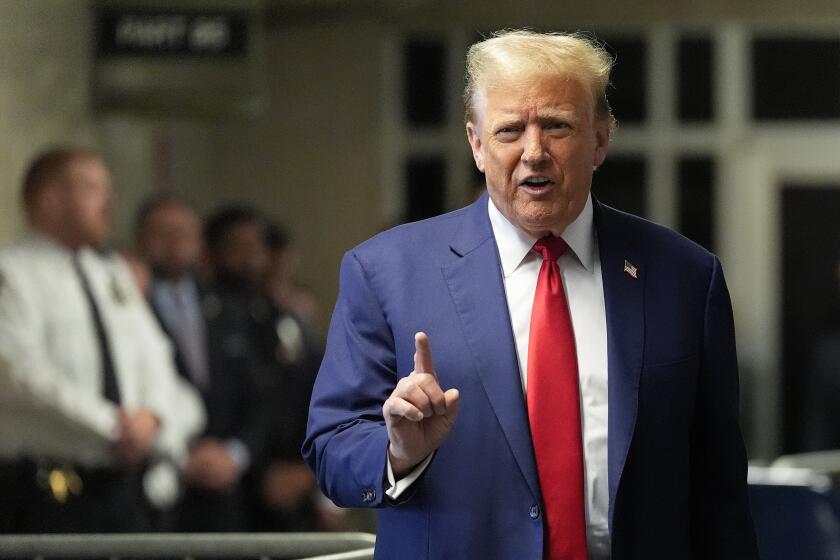Bribe Figured in Air Crash, Russian Says
Russia’s top prosecutor said Wednesday that a suspected suicide bomber bribed her way onto one of two airliners that crashed almost simultaneously last month -- and that both suspected bombers had been considered suspicious before boarding the planes, but the police officer responsible for searching them had failed to do so.
Prosecutor General Vladimir Ustinov also emphasized that corruption is a nationwide problem.
“We have checked how the anti-corruption law is enforced in regional government bodies. The picture is assuming a dangerous shape,” he told the Russian news agency Interfax. “The inspection uncovered 22,000 such violations, including bribery, in half a year alone.”
Ustinov’s comments could be seen as lending support to a plan announced Monday by President Vladimir V. Putin to change electoral laws in a way that would enhance his own power and the Kremlin’s control of the country.
Putin’s proposal would replace the elected heads of Russia’s 89 regions with presidential appointees, subject to confirmation by regional legislatures, and eliminate independent legislators from the lower house of parliament. With pro-Putin parties dominating both houses of parliament, passage of the proposed laws seems to be ensured.
In announcing the plan, Putin said it was needed because the security of citizens could not be ensured without enhancing the government’s ability to address “the entire range of problems facing the country.”
The plan has prompted statements of concern from U.S. officials, including Secretary of State Colin L. Powell and President Bush, who Wednesday urged Putin to uphold the “principles of democracy.”
“I’m also concerned about the decisions that are being made in Russia that could undermine democracy in Russia,” Bush said during remarks to a Hispanic heritage reception at the White House. “Great countries, great democracies have a balance of power between central government and local governments, a balance of power within central governments between the executive branch and the legislative branch and the judicial branch. As governments fight the enemies of democracy, they must uphold the principles of democracy.”
Foreign Minister Sergei V. Lavrov on Wednesday rejected U.S. criticisms, declaring that “the new reforms to be implemented in Russia are our domestic affair.”
“We, for our part, do not comment on the U.S. system of presidential elections, for instance,” he said.
In the southern Russian town of Beslan, schools reopened Wednesday for the first time since the bloody Sept. 3 conclusion of a hostage drama in which militants linked to Chechen separatist rebels seized more than 1,000 people. Students at the school that was attacked were exempt from resuming classes, but at the town’s other schools, children began the day with a minute of silence in memory of those who died.
School principal Irina Azonova said teachers would emphasize that “life is going on, and that we should live and study,” the Russian news agency Itar-Tass reported.
Putin cited the Beslan tragedy, in which about 330 hostages died, in his Monday speech calling for stronger state authority to fight terrorists. At least 430 people have died in attacks since the last week of August, including 90 on the two airplanes, 10 from a suicide bombing near a Moscow subway station, and the school siege fatalities.
In the case of the Aug. 24 airplane crashes, Prosecutor General Ustinov said that a go-between paid $34 to a Sibir Airlines official to help get a suspected terrorist on the flight that she allegedly blew up.
Russian media, citing anonymous law enforcement sources, had reported on the arrest of the suspected go-between, Armen Arutyunov, who apparently earned his living by reselling airplane tickets. He is suspected of aiding the two female terrorist suspects by selling them tickets and helping them get past customs. He claimed to know nothing about the planned terrorist acts, according to these reports.
The women he is suspected of helping -- Amanta Nagayeva and Satsita Dzhebirkhanova -- lived together, along with two other women, in Grozny, capital of Russia’s war-torn southern republic of Chechnya, according to Russian media reports.
Ustinov said that Arutyunov paid the Sibir official to have him mark a last-minute change on Dzhebirkhanova’s ticket, which was for a flight the next day. That action “in violation of all regulations and for a bribe,” Ustinov said, allowed her to board that evening’s flight from Moscow to the Black Sea resort of Sochi. The plane crashed near the southern city of Rostov-on-Don. The airline official has been arrested, he said.
The two women suspects had nearly been caught earlier that evening, Ustinov added.
“Police officers spotted them, confiscated their passports and handed them over to a police captain responsible for anti- terrorism operations to examine their belongings and check these people for their potential role in terrorist attacks,” he said. “The captain let them go without any check, and they started to try to obtain tickets in the same buildings.”
*
Staff writer Maura Reynolds in Washington and Alexei V. Kuznetsov of The Times’ Moscow Bureau contributed to this report.
More to Read
Start your day right
Sign up for Essential California for news, features and recommendations from the L.A. Times and beyond in your inbox six days a week.
You may occasionally receive promotional content from the Los Angeles Times.






